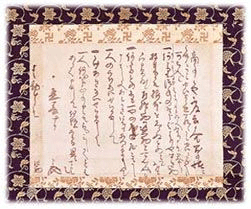Masatomo Sumitomo, the founder of the Sumitomo family, penned these words in his late years. They appear in the preamble of the Monjuin Shiigaki, known as the Founder’s Precepts, which he composed for the benefit of Kanjuro, a member of his family. The work offers guidance on how a merchant should conduct business. Masatomo wrote, “Do your best prudently and meticulously, not only in business, but in every aspect of your life.” He emphasizes that a person aspiring to be a merchant should first cultivate honesty and integrity.
Following these words in the Founder’s Precepts, Masatomo offers specific advice relevant to the business milieu of 17th century Japan. For example, Masatomo cautions, “If items are offered to you at prices lower than the market prices, assume they are stolen goods unless their origin is known.” “Do not put anyone up for the night or accept anyone’s request to look after their belongings.” “Do not act as a broker or provide a guarantee for anyone you do not know.” And “Do not sell or buy on credit.” He concludes the Founder’s Precepts with advice on dealing with difficult people. He writes, “Whatever the person you are dealing with says, do not become short-tempered and argumentative. Instead, provide detailed explanations repeatedly.”

 EN
EN
